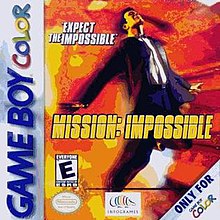
Mario Tennis is a 2000 sports video game developed by Camelot Software Planning and published by Nintendo for the Nintendo 64 (N64). Following Mario's Tennis, it is the second game in the Mario Tennis series. The game is known for being the introduction of Luigi's arch-rival, Waluigi, and the re-introduction of Princess Daisy and Birdo.

Pokémon Stadium, known in Japan as Pokémon Stadium 2, is a strategy video game developed and published by Nintendo for the Nintendo 64. It was released in Japan on April 30, 1999; in North America on March 6, 2000; in Australia on March 23, 2000; and in Europe on April 7, 2000. It was the first Stadium title released in Western regions, succeeding the Japan-only 1998 Nintendo 64 release Pocket Monsters' Stadium. The gameplay revolves around a 3D turn-based battling system using the 151 Pokémon from the Game Boy games Pokémon Red, Blue, and Yellow.

Superman: The New Superman Adventures, commonly referred to as Superman 64, is a 1999 action-adventure game developed and published by Titus Interactive for the Nintendo 64. It is based on the television series Superman: The Animated Series and is the first 3D video game featuring Superman.
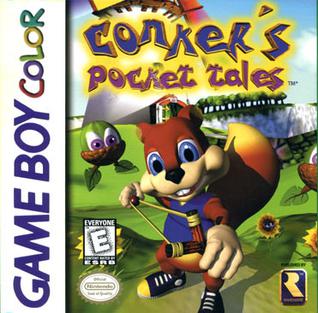
Conker's Pocket Tales is a 1999 action-adventure game developed and published by Rare for the Game Boy Color. It is the first game in the Conker series and follows the story of Conker the Squirrel as he retrieves his stolen birthday presents and rescues his girlfriend Berri, who has been kidnapped by the Evil Acorn. The cartridge is dual-format, allowing it to also run on the original Game Boy with some gameplay differences.
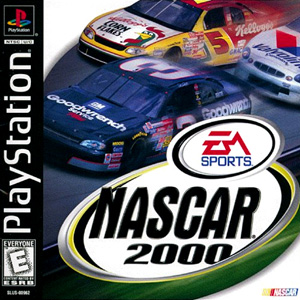
NASCAR 2000 is a racing simulator video game developed by Stormfront Studios and published by EA Sports.

Madden NFL 2000 is a football video game. This was the second of the Madden NFL games to not solely feature John Madden on the cover in North America. The only other one was Madden NFL '95. Most versions of the game cover featured Madden prominently in the foreground, and a recognizable Barry Sanders in a background action graphic. The European PAL edition features only Dorsey Levens on the cover.

All-Star Baseball 2001 is a video game developed by High Voltage Software and KnowWonder and published by Acclaim Entertainment for the Game Boy Color and the Nintendo 64 in 2000.

Mission: Impossible is an action-adventure video game developed by Infogrames and loosely based on the 1996 film of the same name. It was originally released for the Nintendo 64 video game console in 1998. In the game, the player assumes the role of Ethan Hunt, an Impossible Missions Force (IMF) agent who must clear his name after a mole has infiltrated the IMF team. The game features 20 levels where the player must complete several mission objectives with the use of numerous high-tech gadgets.
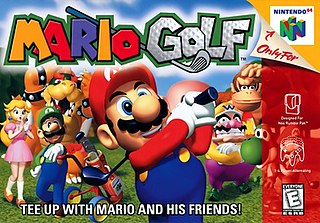
Mario Golf is a 1999 sports game developed by Camelot Software Planning and published by Nintendo for the Nintendo 64. Mario, his friends, and his enemies play golf on a variety of Mario-themed courses. Following NES Open Tournament Golf, it is the second game in the Mario Golf series. Camelot also developed a Game Boy Color version, which adds role-playing elements.

Mickey's Racing Adventure is a racing video game developed by Rare and published by Nintendo for the Game Boy Color in 1999. It was followed by Mickey's Speedway USA in 2001.

Mickey's Speedway USA is a kart racing game developed by Rare and published by Nintendo for the Nintendo 64 and Game Boy Color. It features characters from the Mickey Mouse universe racing across the United States. It is Rare and Nintendo's second collaboration with Disney Interactive following Mickey's Racing Adventure (1999) and Rare's second 3D kart racing game after Diddy Kong Racing (1997).
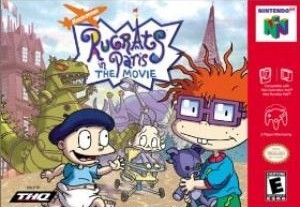
Rugrats in Paris: The Movie is a video game based on the 2000 animated movie of the same name. The game follows the adventures of the Rugrats in a European theme park. A console version of the game was released in 2000, for the PlayStation, Nintendo 64, and a handheld version for Game Boy Color. A version for Microsoft Windows was later released in 2001. The console version's gameplay is similar to Rugrats: Studio Tour, but Paris’ attractions sometimes have minigames too. The handheld gameplay is a side-scrolling platformer. The Windows version's gameplay is an adventure game in which the player must find Chuckie's Wawa Bear.
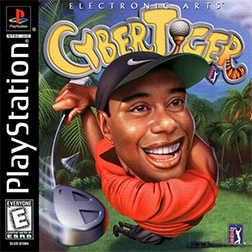
CyberTiger is a 1999 sports game published by Electronic Arts for PlayStation, Nintendo 64 and Game Boy Color. Tiger Woods is the main opponent and is the best-rated player in the game.

F-1 World Grand Prix II is a Formula One racing game for the Nintendo 64, Sega Dreamcast and Game Boy Color. The Nintendo 64 version was released only in Europe in 1999, with other formats following in 2000. The game is a sequel to F-1 World Grand Prix, and is based on the 1998 Formula One season and the 1999 Formula One season.
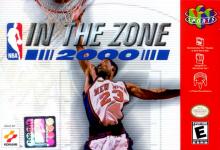
NBA In The Zone 2000 is a basketball video game released for the Nintendo 64, PlayStation, and Game Boy Color in 2000. It is the fifth and final installment of the NBA In The Zone series. The cover features Marcus Camby of the New York Knicks.

Scooby-Doo! Classic Creep Capers is an adventure game published by THQ for the Nintendo 64 and Game Boy Color, based on the Hanna-Barbera cartoon Scooby-Doo, Where Are You!. The Nintendo 64 version, developed by Terraglyph Interactive Studios, was released in November 2000, while the Game Boy Color version was developed by Digital Eclipse Software, and released in February 2001. A PlayStation version, identical to the Nintendo 64 version, had been in development by Terraglyph Interactive Studios but was later cancelled.

Power Rangers Lightspeed Rescue is a video game based on the 8th season of the TV series Power Rangers Lightspeed Rescue. Four distinct versions of the game were produced for Mac OS/Windows, Game Boy Color, Nintendo 64, and PlayStation.
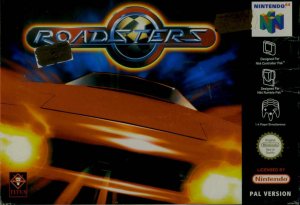
Roadsters is a racing game released by Titus Software for Nintendo 64 in 1999, and for PlayStation, Dreamcast and Game Boy Color in 2000. It is a car racing game that features both licensed cars from manufacturers and unlicensed cars from imaginary manufacturers that are based on and bear great resemblance to their equivalent, real car models. The game also includes a multi-player mode supports up to 2 human players that can compete in any of the available circuits with 4 more CPU controlled racers. A PlayStation 2 version was originally planned to release on April 11, 2001. Box art for unreleased PS2 game url=https://www.ign.com/games/roadsters

Tomb Raider is a 2000 action-adventure video game developed by Core Design and published by THQ for the Game Boy Color under license from series owner Eidos Interactive. Following series protagonist Lara Croft as she searches ruins in South America for a powerful artefact, the gameplay features platforming and puzzle-solving on a 2D side-scrolling environment.

Tarzan is a 1999 platform video game developed by Eurocom Entertainment Software. Based on the 1999 film of the same name, it was released by Sony Computer Entertainment on the PlayStation and Disney Interactive on Microsoft Windows on June 30, 1999, and by Activision on Nintendo 64 in February 15, 2000. An abridged version for the Game Boy Color developed by Digital Eclipse was released in 1999.
